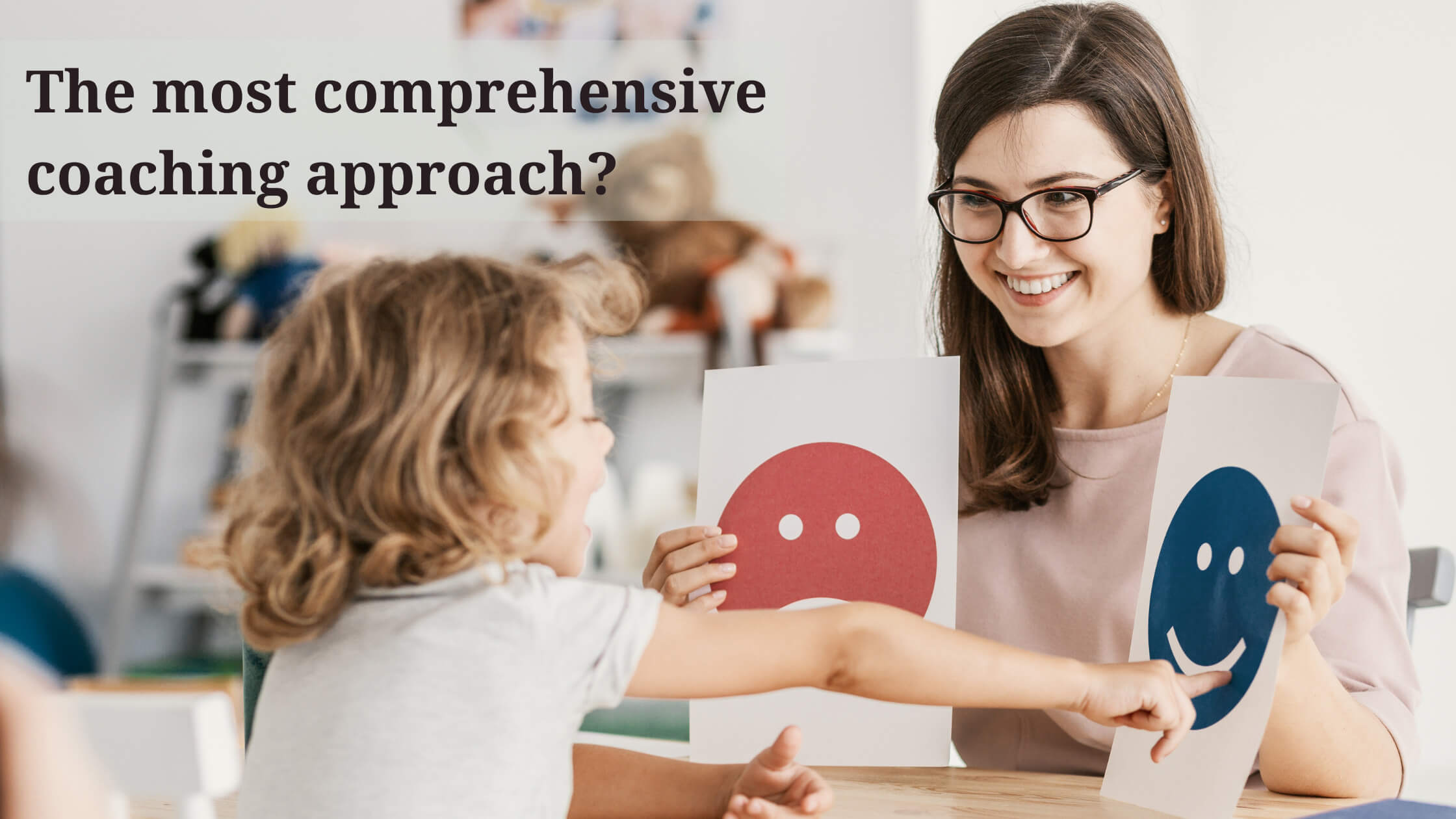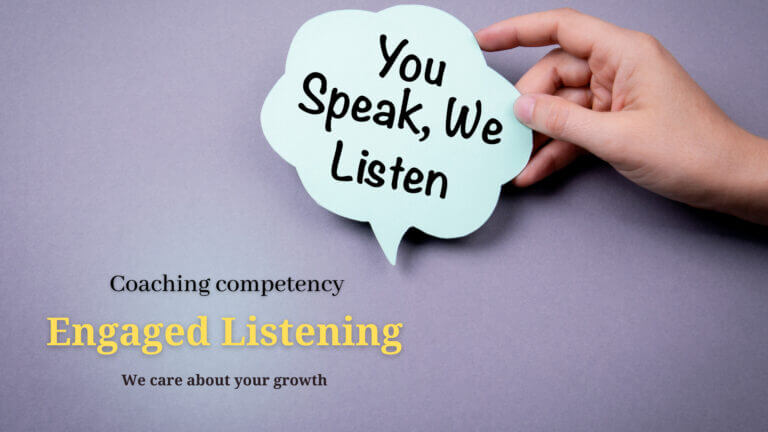In coaching and therapy, the lack of truly engaged listening can lead to misunderstandings and hinder client progress. When practitioners merely hear without deeply listening, clients may feel undervalued and hesitant to share openly.
This disconnect can erode trust, stifle meaningful conversations, and prevent transformative breakthroughs. Without engaged or focused listening, the coaching/therapy relationship remains superficial, limiting the potential for deep, impactful change.
However, by mastering the art of engaged or minful listening, coaches and therapists can create a safe, empathetic space where clients feel genuinely heard and understood. This skill fosters trust, encourages open communication, and facilitates profound personal growth. It transforms coaching sessions, unlocking the potential for remarkable insights and lasting client progress.
What is Engaged Listening?
It is a powerful tool that allows you to delve deeply into a client’s internal world. It is akin to meditation with your eyes open, where your focus is entirely on what your client is saying.
This skill involves accepting, encouraging, and exploring the untapped aspects of your client’s narrative through all five senses. Unlike traditional listening, engaged or focused listening requires using your eyes, ears, and other senses to pick up essential cues. It’s about observing and witnessing sensory signs and actions without any judgment or analysis.
To clarify how engaged listening differs from mind reading, consider the following example:
Imagine you’re in a session with a client. As they speak about someone, they start to blush, their eyes widen, they smile ear to ear, their pitch and tone change, and there is a noticeable shift in their body language. An engaged listener will note these observations without jumping to conclusions and will probe the client to understand the background story. In contrast, a mind reader might incorrectly assume that the client’s reactions are due to a positive memory.
To truly understand and uncover the authentic story, it’s essential to develop and use the right line of questioning, which we have fully explore in the article on effective questioning.
Understanding this Competency
Engaged listening in coaching and therapy encompasses:
- Attuned Attention: Fully focusing on the speaker without internal or external distractions.
- Empathetic Understanding: Sensing the emotions behind a client’s words and responding with compassion.
- Interpretive Skills: Grasping the underlying meanings, beliefs, and values conveyed through language and behaviour.

Developing Engaged or Mindful Listening
Developing the competency of engaged listening requires a conscientious approach to communication and self-awareness. Here are practical steps for enhancing this critical skill.
- Create a Distraction-Free Environment: Minimize external noise and interruptions to foster a space that encourages focus and attentiveness during coaching sessions.
- Cultivate Mindfulness: Practice mindfulness techniques to improve concentration and presence, ensuring you are fully in the moment with your client.
- Exercise Patience: Resist the urge to interrupt or steer the conversation. Allow clients the time they need to express their thoughts and feelings fully.
- Monitor Non-Verbal Cues: Pay attention to body language, tone of voice, and facial expressions, as they can reveal additional layers of meaning beyond words.
- Reflect and Clarify: Periodically paraphrase or summarize what the client has shared to demonstrate understanding and clarify ambiguities.
- Stay Curious: Approach each session with curiosity, asking open-ended questions that encourage deeper insight and exploration.
- Self-Review and Seek Feedback: After coaching interactions, reflect on your listening skills and seek feedback from clients or supervisors to identify areas for improvement.
Application in Coaching Practice
Applying engaged listening within coaching or therapeutic sessions is a practice that, when honed, can yield profound insights and breakthroughs for clients. Here’s how to embody engaged or focused listening actively in your practice.
- Listening Beyond Words: Tune into the implicit messages and emotions that clients may communicate beyond mere words. This deeper level of listening can often unearth underlying issues and help facilitate meaningful change.
- Empathetic Responsiveness: Respond to clients in a way that authentically conveys your understanding of their emotional state. This helps in building a stronger connection and trust with the client.
- Encouraging Expression: Create an atmosphere that encourages clients to share openly. Use affirming language and non-verbal cues to signal that all thoughts and feelings are valid and worthy of expression.
- Interactive Dialogue: Engaged listening is not passive; ask clarifying questions and engage in a dialogue that prompts clients to reflect deeply and articulate their experiences more fully.
- Integration of Insights: Utilize the insights gained from engaged and focused listening to inform and adapt your coaching or therapeutic approach, ensuring that it aligns with the client’s lived experience.

Cognitive Hypnotic Coaching Framework’s Approach to Enhancing Engaged Listening
The Cognitive Hypnotic Coaching (CHC) framework offers valuable insights and techniques to amplify the skill of engaged and mindful listening, crucial for fostering meaningful client interactions. Here’s how the CHC framework enhances engaged and focused listening.
- Holistic Attention: CHC trains coaches to attune to clients holistically, considering their words, emotional states, body language, and unconscious cues, thus enriching the listening experience.
- Rapport Building: Using NLP techniques, CHC practitioners quickly establish rapport, creating a comfortable space for clients to communicate openly and authentically.
- Empathetic Attunement: The CHC framework emphasizes the role of empathy in engaged listening, teaching coaches to connect deeply with a client’s feelings and experiences.
- Subconscious Communication: CHC includes training on interpreting and utilizing subconscious communication, such as micro-expressions and voice tonality, to understand clients beyond the verbal level.
- Reflective Techniques: Coaches learn to use reflective and mirroring techniques effectively, demonstrating active understanding and promoting client self-awareness.
By incorporating these CHC approaches, coaches can practice engaged listening at a level that not only hears but also profoundly perceives, opening pathways to transformative client insights and breakthroughs.
Overcoming Challenges and Pitfalls
Even the most seasoned coaches and therapists can encounter obstacles in their pursuit of mastering engaged and mindful listening. Understanding these challenges and having strategies to overcome them is crucial. Here are some common hurdles, along with solutions provided by the Cognitive Hypnotic Coaching framework.
- Distractions During Sessions: Use techniques such as centering and mindfulness to maintain presence, and create a physical environment that minimizes interruptions.
- Overwhelm by Client’s Emotions: CHC teaches self-regulation skills to manage personal emotional responses, maintaining a calm, empathetic stance.
- Misinterpretation of Non-Verbal Cues: Develop skills in accurately reading body language and facial expressions through CHC training, and clarify assumptions with the client as needed.
- Listener Bias: Engage in continuous self-reflection and seek supervision when necessary to address and mitigate unconscious biases.
- Solution-Focused Prematurely: CHC emphasizes the importance of understanding before solving, encouraging coaches to fully explore the client’s perspective before transitioning to problem-solving.
Ethical Considerations
Ethical conduct is paramount in coaching and therapy, and engaged listening is no exception. Practitioners must heed certain ethical guidelines to listen not only effectively but responsibly. Here are vital ethical considerations aligned with the Cognitive Hypnotic Coaching (CHC) framework.
- Maintaining Conscientious Boundaries: It’s crucial to be mindful of the professional boundaries set forth within the framework of engaged and focused listening, ensuring that the therapeutic relationship remains appropriate and constructive.
- Respecting Client Confidentiality: All information shared by the client must be kept confidential, fostering a safe space where open communication is protected.
- Avoiding Assumptions: Coaches must challenge their assumptions and avoid imposing their interpretations onto the client’s experiences, upholding the ethical principle of respect for client autonomy.
- Cultural Competence: Engaged listening must be practiced with cultural sensitivity, honoring the client’s background, language, and customs as central to their identity and experience.
- Professional Honesty: Practitioners should listen with integrity, providing honest but compassionate feedback, free from deceit or misleading information.
- Non-Judgmental Stance: Upholding a non-judgmental stance is essential, allowing clients to speak freely without fear of criticism or moral judgment.
Abiding by these ethical considerations in engaged and focused listening not only fortifies trust and rapport but ensures that the coaching or therapeutic process is conducted with the client’s best interests at heart.
Conclusion
Engaged listening is a cornerstone competency that requires commitment, practice, and a deep understanding of its nuanced application in the coaching and therapy context. It is the crucible within which trust is formed and the medium through which deep, meaningful self-discovery and personal growth are facilitated for clients. Through the art of truly hearing and the skill of responsive empathy, coaches and therapists can guide their clients towards transformative breakthroughs and sustained progress.
Adopting the principles and strategies of the Cognitive Hypnotic Coaching and Psychotherapy framework enhances the coach or therapist’s ability to listen with purpose and understanding, shaping a practice that honors the intricacy of the human narrative. As we hone our listening skills, we not only become better practitioners but also empower our clients to express their truths more fully, catalyzing their journey of change.
Engaged listening is an ongoing journey of learning and refinement. It calls for a delicate balance of structure, empathy, and ethical mindfulness. By cultivating this vital skill, we affirm our dedication to our clients’ well-being and to the integrity of the coaching and therapy professions.
If you are a coach or aspiring to be one who wants to make it big, we would really recommend that you explore and understand the Cognitive Hypnotic Coaching framework.
If you are already convinced and want to just know how can you become a Cognitive Hypnotic Coach, check out our Comprehensive Coaching Diploma

